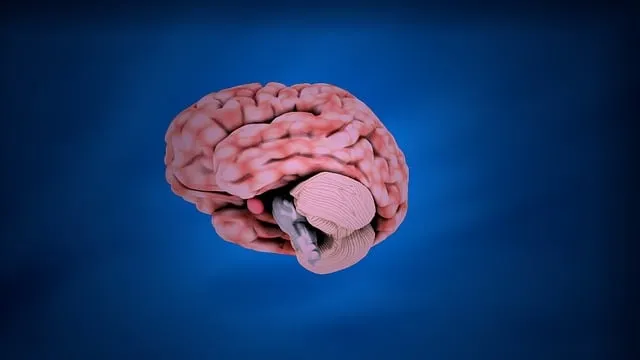Stress is a significant challenge for healthcare professionals, particularly those in mental health roles like Kaiser Permanente mental health jobs Littleton, stemming from heavy caseloads, emotional labor, long hours, and high expectations. To combat burnout, healthcare providers should adopt positive thinking, anxiety relief techniques, self-care practices (e.g., setting boundaries, mindfulness), and engaging in relaxing activities. Teaching stress management techniques like Resilience Building, journaling exercises, and coping skills development empowers individuals to manage stress effectively, promoting academic success and overall well-being. Kaiser Permanente mental health jobs in Littleton offer specialized support using evidence-based strategies focusing on emotional intelligence and self-care routines, enhancing resilience and job satisfaction. Effective programs should include practical tools, interactive activities, Risk Management Planning, self-esteem improvement, and regular self-awareness exercises for sustained benefits.
Stress management techniques teaching plays a vital role in enhancing employee well-being, particularly within demanding environments like Kaiser Permanente mental health jobs in Littleton. This article explores the multifaceted approach to managing stress effectively. We delve into understanding its impact and causes, highlighting the empowering role of teaching individuals to take control. Discover evidence-based techniques and personalized strategies tailored for diverse learners, backed by insights on implementing and sustaining successful stress management training programs.
- Understanding Stress: Unveiling the Impact and Causes for Kaiser Permanente Mental Health Jobs in Littleton
- The Role of Teaching: Empowering Individuals to Manage Stress Effectively
- Evidence-Based Techniques: A Toolkit for Stress Management
- Personalized Approaches: Tailoring Strategies for Diverse Learners at Kaiser Permanente
- Implementing and Sustaining Change: Tips for Effective Stress Management Training Programs
Understanding Stress: Unveiling the Impact and Causes for Kaiser Permanente Mental Health Jobs in Littleton

Stress is a pervasive issue among healthcare professionals, particularly those in mental health roles like Kaiser Permanente mental health jobs Littleton. Understanding stress involves recognizing its multifaceted nature and far-reaching impact on both personal well-being and professional performance. The demands of caring for others’ mental health can lead to increased anxiety, burnout, and even physical exhaustion if not managed effectively.
Unveiling the causes of stress in these roles reveals a complex web involving heavy caseloads, emotional labor, long working hours, and high expectations. For example, healthcare providers in Kaiser Permanente mental health jobs Littleton often grapple with the challenge of balancing patient needs with limited resources, which can heighten stress levels. Positive thinking and anxiety relief techniques are crucial tools for burnout prevention strategies for healthcare providers. Encouraging self-care practices, such as setting boundaries, practicing mindfulness, and engaging in activities that foster relaxation, can help mitigate these stressors and promote a healthier work-life balance.
The Role of Teaching: Empowering Individuals to Manage Stress Effectively

Teaching plays a pivotal role in empowering individuals to manage stress effectively. By incorporating techniques such as Resilience Building, mental wellness journaling exercises, and coping skills development, educators can equip students with valuable tools to navigate stressful situations. These strategies are not just beneficial for academic success but also for overall well-being, particularly when supported by resources like those offered by Kaiser Permanente mental health jobs in Littleton.
Effective teaching goes beyond conveying knowledge; it involves fostering self-awareness and emotional intelligence. By providing guidance on Mental Wellness Journaling Exercises, educators help students develop a deeper understanding of their stress triggers and patterns. This self-reflection becomes a powerful tool for managing stress, enabling individuals to make informed decisions about their mental health, much like finding a map to navigate through complex emotions and challenging life circumstances.
Evidence-Based Techniques: A Toolkit for Stress Management

Stress management is a crucial aspect of overall well-being, and evidence-based techniques offer individuals a powerful toolkit to navigate life’s challenges. For those seeking guidance, Kaiser Permanente mental health jobs in Littleton provide access to specialized professionals who employ such strategies. These methods focus on empowering individuals to take control of their mental health and foster resilience. One such approach is Emotional Intelligence, which involves recognizing and managing one’s emotions effectively, thereby reducing stress and improving relationships.
Additionally, developing a Self-Care Routine is essential for maintaining good mental health. This routine can include activities like mindfulness meditation, regular exercise, and adequate sleep—all of which have been shown to prevent depression. By integrating these practices into daily life, individuals can better cope with stress and enhance their overall quality of life.
Personalized Approaches: Tailoring Strategies for Diverse Learners at Kaiser Permanente

At Kaiser Permanente, recognizing the diverse needs of learners is paramount to effective stress management teaching. Personalized approaches are implemented to cater to a wide range of individuals, from healthcare providers in fast-paced environments like Littleton to those engaging in community outreach program implementations. This tailored strategy ensures that everyone receives relevant and practical mental health jobs training.
For instance, burnout prevention strategies for healthcare providers focus on emotional well-being promotion techniques, considering the unique challenges they face daily. These customized interventions help them manage stress levels, enhancing their resilience and overall job satisfaction. By adopting such personalized methods, Kaiser Permanente fosters a supportive environment where learners can thrive and develop sustainable coping mechanisms.
Implementing and Sustaining Change: Tips for Effective Stress Management Training Programs

Implementing and sustaining change is key to the success of any stress management training program, especially when aiming to equip professionals like those at Kaiser Permanente mental health jobs Littleton. Effective programs should provide practical tools that participants can readily incorporate into their daily lives. This includes teaching techniques such as mindfulness meditation, deep breathing exercises, and progressive muscle relaxation, which have been scientifically proven to reduce stress levels.
To ensure longevity, these training sessions should go beyond mere theory by incorporating interactive activities like role-playing scenarios and group discussions. Such approaches foster a deeper understanding of the concepts and encourage peer-to-peer learning. Moreover, programs can enhance sustainability by including components related to Risk Management Planning for Mental Health Professionals, promoting Self-Esteem Improvement, and engaging in regular Self-Awareness Exercises.
Stress management techniques teaching plays a pivotal role in enhancing well-being, especially for professionals like those in Kaiser Permanente mental health jobs in Littleton. By equipping individuals with evidence-based tools and personalized approaches, organizations can foster resilient and productive environments. Implementing effective training programs that delve into understanding stress, empowering teachers, and providing tailored strategies ensures sustained improvements in managing stress among diverse learners.






